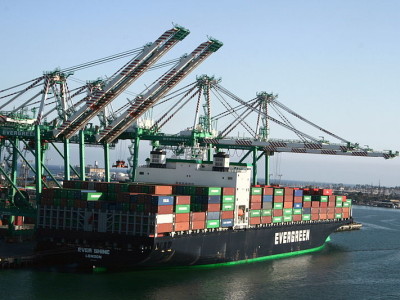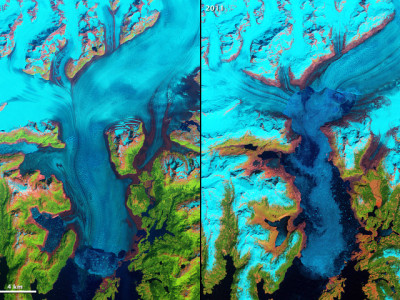Climate Change
Still Waiting For Supreme Court Decision on Greenhouse Gas Emissions Cert Petition
We May Learn This Week Whether Court Takes Up Important Climate Change Case
Court watchers are still waiting to learn whether the U.S. Supreme Court will hear the second most important federal case involving greenhouse gas emissions, Coalition for Responsible Regulation v. EPA. The Court is closed today for a federal holiday (not because of the shutdown) but any day we should hear about whether it will take …
CONTINUE READINGClimate Denial and the First Amendment
The First Amendment protects even the right to support demonstrably false positions like climate denial.
The editors of the L.A. Times won’t publish letters by climate deniers, on the ground that they don’t want to take up valuable space with false information. Which raises the question: what does the First Amendment have to say about climate denial? Nothing in constitutional law is 100% clear, but here’s a stab at the …
Continue reading “Climate Denial and the First Amendment”
CONTINUE READINGDenial As a Way of Life
Climate denial is closely related to debt-ceiling denial.
As it turns out, many of the same people who deny that climate change is a problem also deny that government default would be a problem. No doubt there are several reasons: the fact that Barack Obama is on the opposite side of both issues; the general impermeability of ideologues to facts or expert opinion; …
Continue reading “Denial As a Way of Life”
CONTINUE READINGCalifornia Enacts Nation’s First Comprehensive Fracking Law—And Everyone’s Unhappy
Controversial But Promising, SB 4 Constitutes Tangible Progress on the Fracking Front
Late last month the California Legislature passed, and Governor Jerry Brown signed into law, the nation’s first comprehensive system of regulating hydraulic fracturing, the oil and gas drilling technique more commonly known as “fracking.” It turns out that no one–the oil and gas industry, surface landowners or environmentalists–is particularly happy with the new law. And …
CONTINUE READINGEnvironmental Review of Free Trade Agreements
Why aren’t we talking about climate change?
Last week, the period for public comment on an interim environmental review of the Trans-Pacific Partnership (TPP) trade agreement closed, marking perhaps the last significant opportunity for public input on the environmental impacts of the proposed agreement. The review was conducted to identify potential environmental effects of the TPP, as required by an Executive Order …
Continue reading “Environmental Review of Free Trade Agreements”
CONTINUE READINGCarbon Budgeting
The IPCC highlights the importance of the carbon budget, the total amount of CO2 emitted during this century.
The first volume of the latest IPCC report is now public. It’s a very lengthy document, and since it’s written by physical scientists rather than journalists, it’s not an easy read. One important concept that seems to be a lot more important in this version of the IPCC is the carbon budget. The key …
Continue reading “Carbon Budgeting”
CONTINUE READINGThe New IPCC Assessment, Carbon Budgets and the Role of the U.S.
National Academy Study Used the Carbon Budget Approach Taken in New IPCC Report to Show How the U.S. Could Limit Emissions
Today’s major environmental news is, of course, the release of the Intergovernmental Panel on Climate Change’s 5th Assessment Report addressing the physical science basis for climate change. The findings are strong and alarming: warming of the climate system is unequivocal and unprecedented; atmospheric concentrations of carbon dioxide and other greenhouse gas emissions “have increased to …
Continue reading “The New IPCC Assessment, Carbon Budgets and the Role of the U.S.”
CONTINUE READINGIf we could see it, would we stop it?
Making carbon pollution visible.
Cross-posted at The Berkeley Blog. It’s difficult to see something as a problem if we can’t see it at all. That’s one problem with coming to grips with greenhouse gas pollution. It doesn’t show up in the air the way smog does, and its impacts aren’t directly linked to emissions in perceptible ways. Interestingly, it …
Continue reading “If we could see it, would we stop it?”
CONTINUE READINGA New Climate Threat: “Academic Freedom” Laws
The other day I suggested that climate advocates ought to start working in school board elections as a way of building long term political support for vigorous climate action. Well, it looks like they will need to start playing defense as well. October’s Scientific American reports that climate deniers are now pushing the Orwellian “academic …
Continue reading “A New Climate Threat: “Academic Freedom” Laws”
CONTINUE READINGToday’s House Subcommittee Hearing on Climate Change
President Obama’s recent announcement on climate change irritated some in Congress—but we didn’t need a hearing to find that out.
Today, Republican leaders in the House Energy and Power Subcommittee called a hearing to discuss climate change. Has the Right suddenly taken an interest in responding to climate change? As you might anticipate, the answer is no. The hearing, entitled “The Obama Administration’s Climate Change Policies and Activities,” focused on attacks to the President’s Climate …
Continue reading “Today’s House Subcommittee Hearing on Climate Change”
CONTINUE READING








